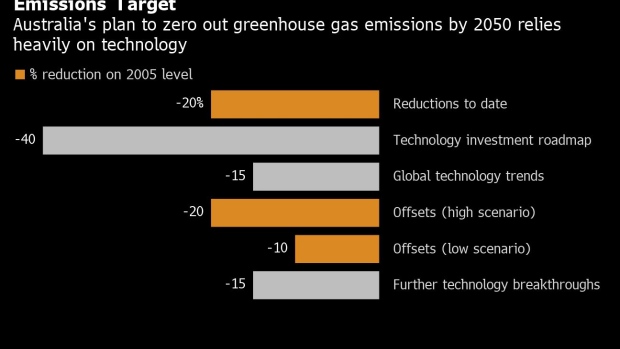May 18, 2022
Ditching Climate Outcast Tag May Test a New Australia Government
, Bloomberg News

(Bloomberg) -- Australia’s main opposition Labor party will face a challenge to restore the country’s tarnished reputation on climate action if it wins power this weekend.
Prime Minister Scott Morrison, who narrowly trails in polls before Saturday’s vote, has faced criticism — including from the White House — for a lack of action on planetary warming and a net-zero plan that’s heavily reliant on unproven technology.
While Labor leader Anthony Albanese has vowed to make climate diplomacy a focus, his modest tightening of targets and continued support of coal threaten to extend the nation’s outlier status.
“Their climate action wouldn't be considered enough,” said Kate Dooley, a lecturer at the University of Melbourne and previously a climate analyst and consultant who’s tracked United Nations negotiations since 2009. “But it would feel like there's a government now in place who will consider increasing their ambition.”
How Climate Is Splintering Australia’s Politics: David Fickling
Advocates for faster climate action say Australia’s approach is globally relevant because it is among the world’s largest per-capita emitters and fossil fuel exporters. Critics also argue its timid policies have weakened the ability of developed countries to press emerging economies — including China, India and Saudi Arabia — to accelerate their own efforts.
Here are some of the key climate policy debates in Australia’s election campaign:
Emissions Reduction
Morrison’s government says its policies have the nation on track to curb greenhouse gas emissions by as much as 35% on 2005 levels by 2030, beyond the country’s existing international commitment to make cuts of 26% to 28%.
Labor insists its proposals can reduce emissions by 43% by the same date and has committed to update Australia’s pledges to the UN to reflect that ambition. Albanese argues his 2030 target will bring Australia back into line with nations including Canada, South Korea and Japan, though it remains less ambitious than action promised by the US, European Union and the UK.
Australia was among the last major democracies to set a goal to zero out carbon emissions by 2050, and neither main party has pledged to enshrine the target in law. Morrison’s government has been pilloried over its proposals, which envisage about 70% of emission reductions to 2050 being delivered by the adoption and development of low-emission technologies, and as much as 20% by the use of offsets.
Labor’s plans include making gradual reductions to baselines set under Australia’s safeguard mechanism, which requires the largest polluters to offset emissions above a certain threshold. Albanese would also invest A$20 billion ($14 billion) to improve electricity infrastructure in an effort to boost the proportion of renewables in the nation’s main grid to 82%.
Climate Agreements
Morrison was excluded from a climate action summit in 2020 and dithered before attending last year’s COP26 talks in Glasgow. He’s also declined to join a pact on tackling methane emissions, and has rejected deadlines to end the sales of new internal combustion engine cars or to phase out the use of coal-fired power.
The existing perception of Australia is as a country that wants “fossil fuel exports to last as long as possible, preferably indefinitely, which is of course incompatible with ambitions to limit climate change,” said Frank Jotzo, an academic in climate economics and policy at the Australian National University.
Albanese’s policy platform includes a pledge to bid to stage the COP29 climate talks in 2024 and to offer Pacific Island nations an opportunity to join as co-hosts.
"We are in the naughty corner at UN Framework Convention on Climate Change conferences, that's the truth,” Albanese told reporters Wednesday in Canberra. A Labor government would take steps to bolster climate cooperation with the US, he said.
Coal’s Future
Australia’s reliance on coal is likely to prove increasingly problematic for any new government, as future global climate negotiations will focus on setting a date to end the use of the fossil fuel, according to Dooley.
Coal accounts for more than half of Australia’s electricity generation and is a key source of export earnings, swelled in recent months by surging demand for the nation’s output as consumers shun Russian supply.
Morrison in March backed Australia’s coal-fired power fleet to keep running for “as long as you possibly can,” even as the country’s utilities bring forward plans to retire the assets and replace them with renewables and energy storage. His government has also supported the expansion of coal mining, and in March won a challenge against a legal ruling that asked officials to assess the climate impacts of projects.
Read more: A Showdown Over Coal Could Decide Who Wins Australia's Election
While Labor has backed a faster exit for local coal power stations, Albanese appears reluctant to place curbs on the mining sector, said Richie Merzian, director of the climate and energy program at the Australia Institute think tank, which advocates for faster emissions reductions. “It doesn't look like Labor will do much by way of Australia's fossil fuel production,” said Merzian, a former climate negotiator.
If coal mines win environmental approvals and companies make the decision to invest “then Labor would welcome any jobs that would be created from that,” Albanese told reporters in Brisbane last month.
©2022 Bloomberg L.P.






